For the 2025 school year, there are 2 public preschools serving 516 students in South Summit School District. This district's average pre testing ranking is 4/10, which is in the bottom 50% of public pre schools in Utah.
Public Preschools in South Summit School District have an average math proficiency score of 43% (versus the Utah public pre school average of 41%), and reading proficiency score of 31% (versus the 42% statewide average).
Minority enrollment is 16% of the student body (majority Hispanic), which is less than the Utah public preschool average of 31% (majority Hispanic).
Overview
This School District
This State (UT)
# Schools
6 Schools
408 Schools
# Students
1,685 Students
195,137 Students
# Teachers
91 Teachers
9,057 Teachers
Student : Teacher Ratio
19:1
19:1
District Rank
South Summit School District, which is ranked within the top 50% of all 153 school districts in Utah (based off of combined math and reading proficiency testing data) for the 2020-2021 school year.
The school district's graduation rate of 90-94% has stayed relatively flat over five school years.
Overall District Rank
#63 out of 154 school districts
(Top 50%)
(Top 50%)
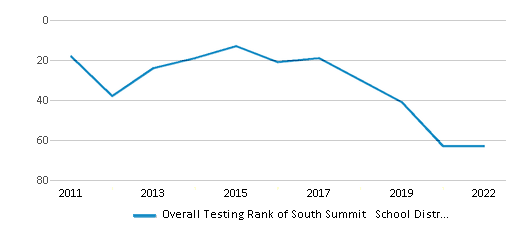
Math Test Scores (% Proficient)
(20-21)39%
39%
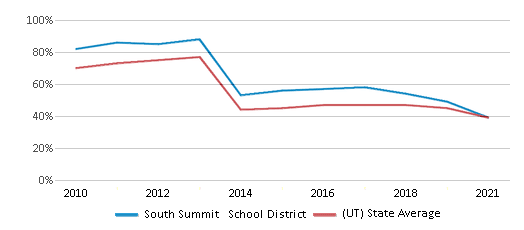
Reading/Language Arts Test Scores (% Proficient)
(20-21)42%
43%
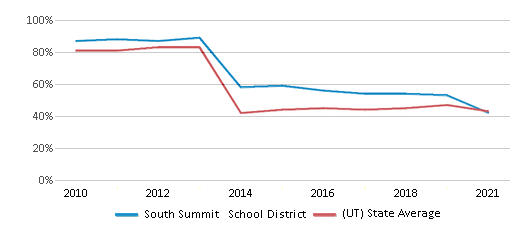
Science Test Scores (% Proficient)
(20-21)44%
45%
Graduation Rate
90-94%
88%
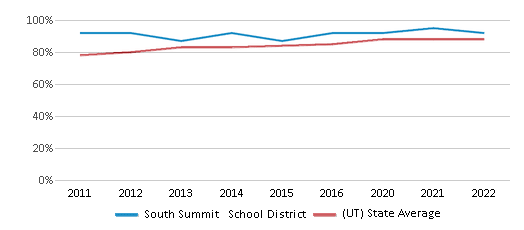
Students by Ethnicity:
Diversity Score
0.28
0.48
# American Indian Students
5 Students
2,004 Students
% American Indian Students
n/a
1%
# Asian Students
1 Student
2,792 Students
% Asian Students
n/a
2%
# Hispanic Students
254 Students
41,494 Students
% Hispanic Students
15%
21%
# Black Students
5 Students
2,695 Students
% Black Students
n/a
1%
# White Students
1,406 Students
134,941 Students
% White Students
84%
69%
# Hawaiian Students
n/a
3,551 Students
% Hawaiian Students
n/a
2%
# Two or more races Students
14 Students
7,647 Students
% of Two or more races Students
1%
4%
Students by Grade:
# Students in PK Grade:
54
16,151
# Students in K Grade:
94
23,940
# Students in 1st Grade:
101
24,978
# Students in 2nd Grade:
111
26,403
# Students in 3rd Grade:
102
26,290
# Students in 4th Grade:
108
26,559
# Students in 5th Grade:
140
27,209
# Students in 6th Grade:
121
18,075
# Students in 7th Grade:
161
1,029
# Students in 8th Grade:
113
1,462
# Students in 9th Grade:
151
1,079
# Students in 10th Grade:
153
570
# Students in 11th Grade:
136
560
# Students in 12th Grade:
140
832
# Ungraded Students:
-
-
District Revenue and Spending
The revenue/student of $15,612 is higher than the state median of $10,732. The school district revenue/student has stayed relatively flat over four school years.
The school district's spending/student of $14,746 is higher than the state median of $10,829. The school district spending/student has stayed relatively flat over four school years.
Total Revenue
$26 MM
$7,309 MM
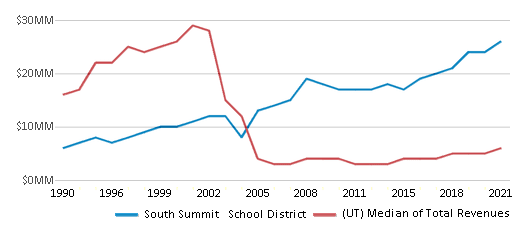
Spending
$25 MM
$7,375 MM
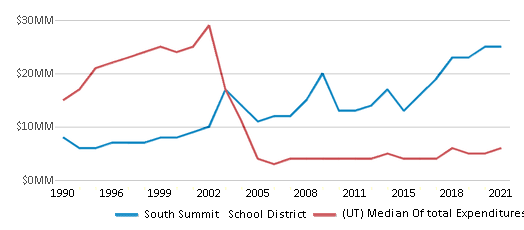
Revenue / Student
$15,612
$10,732
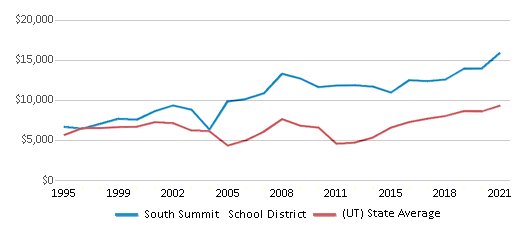
Spending / Student
$14,746
$10,829
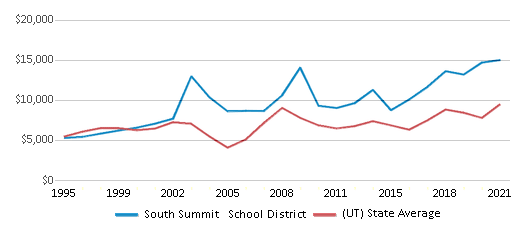
Best South Summit School District Public Preschools (2025)
School
(Math and Reading Proficiency)
(Math and Reading Proficiency)
Location
Grades
Students
Rank: #11.
South Summit School
(Math: 43% | Reading: 31%)
Rank:
Rank:
4/
Bottom 50%10
535 E 300 S
Kamas, UT 84036
(435) 783-4318
Kamas, UT 84036
(435) 783-4318
Grades: PK-4
| 516 students
Rank: n/an/a
South Summit Preschool
Special Education School
375 E 300 S
Kamas, UT 84036
(435) 783-4301
Kamas, UT 84036
(435) 783-4301
Grades: PK
| n/a students
Recent Articles

Sexual Harassment at Age 6: The Tale of a First Grade Suspension
A six-year old in Aurora, Colorado, was suspended after singing an LMFAO song to a little girl in his class and reportedly “shaking his booty.” We look at the case and the sexual harassment problem in public schools today.

How Scaffolding Could Change the Way Your Child Learns
This article explores the concept of instructional scaffolding, a teaching method that enhances learning by breaking down complex tasks into manageable parts. It highlights how scaffolding supports students in developing critical thinking skills and becoming more independent learners. The article discusses the benefits of scaffolding, including improved engagement and reduced anxiety, and provides strategies for its implementation across various educational levels.

February 05, 2025
Understanding the U.S. Department of Education: Structure, Impact, and EvolutionWe explore how the Department of Education shapes American education, from its cabinet-level leadership to its impact on millions of students, written for general audiences seeking clarity on this vital institution.





